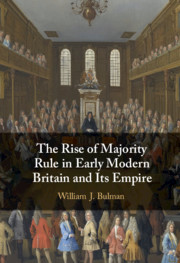Book contents
- The Rise of Majority Rule in Early Modern Britain and Its Empire
- The Rise of Majority Rule in Early Modern Britain and Its Empire
- Copyright page
- Dedication
- Contents
- Figures
- Tables
- Acknowledgments
- Note on the Text
- Abbreviations
- 1 Introduction
- 2 Consensus in the Commons, 1547–1642
- 3 Consensus Imperiled, 1640–1641
- 4 Consensus Destroyed, 1641–1643
- 5 Revolutionary Decisions, 1643–1660
- 6 The Majority Institutionalized, 1660–1800
- 7 Little Parliaments in the Atlantic Colonies, 1613–1789
- 8 Conclusion
- Bibliography
- Index
7 - Little Parliaments in the Atlantic Colonies, 1613–1789
Published online by Cambridge University Press: 22 March 2021
- The Rise of Majority Rule in Early Modern Britain and Its Empire
- The Rise of Majority Rule in Early Modern Britain and Its Empire
- Copyright page
- Dedication
- Contents
- Figures
- Tables
- Acknowledgments
- Note on the Text
- Abbreviations
- 1 Introduction
- 2 Consensus in the Commons, 1547–1642
- 3 Consensus Imperiled, 1640–1641
- 4 Consensus Destroyed, 1641–1643
- 5 Revolutionary Decisions, 1643–1660
- 6 The Majority Institutionalized, 1660–1800
- 7 Little Parliaments in the Atlantic Colonies, 1613–1789
- 8 Conclusion
- Bibliography
- Index
Summary
This chapter describes and explains the emergence of majoritarian decision-making in twenty-seven lower colonial assemblies in Ireland, mainland North America, and the Caribbean between 1619 and 1776. It documents the peculiar conditions under which majoritarian politics developed in the colonies while also registering the importance of attempts to imitate parliamentary practices. Colonial lower assemblies were created under conditions fundamentally different from those that prevailed in the Westminster House of Commons. Some were part of corporations and proprietorships, not royal colonies; and some initially admitted all freemen, not simply elected representatives. These factors led to distinctive institutional trajectories. In general and over the long run, these factors appear to have reinforced a tendency for the colonial lower assemblies to be or become majoritarian. By scrutinizing the available evidence, one is left with the overwhelming impression of a total embrace of majoritarian politics before the American Revolution and, in most cases, long before that time. As the colonial lower assemblies of North America became provincial congresses and then state lower assemblies, they predictably continued their majoritarian practices. This pattern continued in the first intercolonial assemblies and in the US House of Representatives.
Keywords
- Type
- Chapter
- Information
- The Rise of Majority Rule in Early Modern Britain and Its Empire , pp. 208 - 245Publisher: Cambridge University PressPrint publication year: 2021

